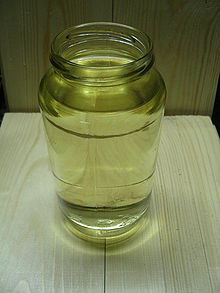
Back Petrol Afrikaans Benzin ALS ቤንዚን Amharic Benzina AN وقود السيارات Arabic بنزين ARZ Gasolina AST Benzin Azerbaijani Бензин Bashkir Gasolina BCL

Gasoline (North American English) or petrol (Commonwealth English) is a petrochemical product characterized as a transparent, yellowish, and flammable liquid normally used as a fuel for spark-ignited internal combustion engines. When formulated as a fuel for engines, gasoline is chemically composed of organic compounds derived from the fractional distillation of petroleum and later chemically enhanced with gasoline additives. It is a high-volume profitable product produced in crude oil refineries.[1]
The fuel-characteristics of a particular gasoline-blend, which will resist igniting too early are measured as the octane rating of the fuel blend. Gasoline blends with stable octane ratings are produced in several fuel-grades for various types of motors. A low octane rated fuel may cause engine knocking and reduced efficiency in reciprocating engines. Tetraethyl lead was once widely used to increase the octane rating but are not used in modern automotive gasoline due to the health hazard. Aviation, off-road motor vehicles, and racing car motors still use leaded gasolines.[2][3]
- ^ Gary, James H.; Handwerk, Glenn E. (2001). Petroleum refining: technology and economics (4. ed.). New York Basel: Dekker. p. 1. ISBN 978-0-8247-0482-7.
- ^ "Why small planes still use leaded fuel decades after phase-out in cars". NBC News. 22 April 2021. Archived from the original on 2 June 2021. Retrieved 2 June 2021.
- ^ "Race Fuel 101: Lead and Leaded Racing Fuels". Archived from the original on 25 October 2020. Retrieved 30 July 2020.